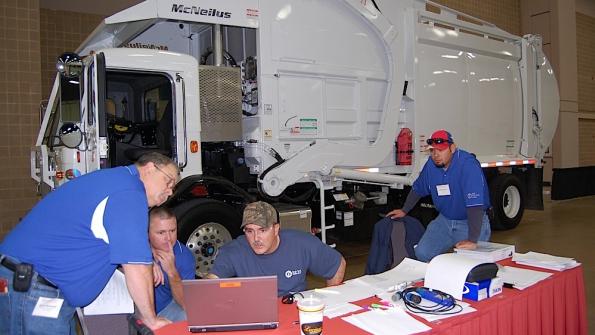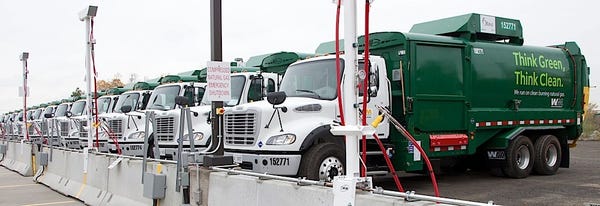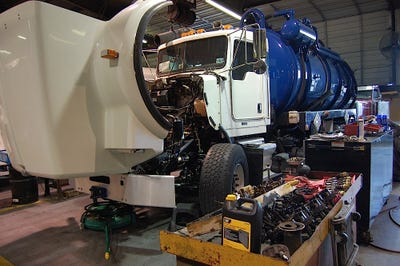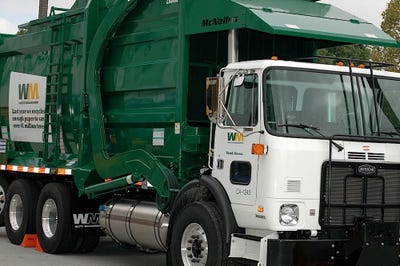Refuse fleets will need new tactics to attract, retain and train truck technicians as the field becomes more dependent on new technologies.
March 24, 2013
Sean Kilcarr, Contributing Writer
Even as the demand for truck and diesel engine technicians continues to grow, there’s a dearth of young hands willing to take up the laptops and wrenches of a trade critical to keeping commercial vehicles up and running.
According to the U.S. Bureau of Labor Statistics (BLS), the total population of truck, bus and diesel engine technicians is expected to expand from 242,200 back in 2010 to more than 277,400 by 2020, but that doesn’t tell the whole story.
 While the agency noted those numbers indicate 35,200 new positions will open up in the technician ranks, the real job opening figure is 87,800, as BLS projects some 52,600 current techs are expected to retire by 2020 – a massive draw down a scant seven years over the horizon.
While the agency noted those numbers indicate 35,200 new positions will open up in the technician ranks, the real job opening figure is 87,800, as BLS projects some 52,600 current techs are expected to retire by 2020 – a massive draw down a scant seven years over the horizon.
Yet that picture gets even more complicated for refuse fleets, stresses Darry Stuart, president of Wrentham, Mass.-based DWS Fleet Management Services, as they typically don’t offer the pay or often nicer surroundings that a luxury car dealership or high-end freight hauling company can offer.
“You are competing against BMW dealerships that can offer experienced technicians salaries up to $100,000 plus a clean, well-lit shop to work in,” he explains. “By comparison, you’ve got $50,000 to $60,000 rough annual salaries for technicians in the waste business and they’ll be working on vehicles that haul garbage 24/7.”
For that reason, Stuart – who spent five of his 40-plus-year career as a fleet manager at the former waste collection giant Browning Ferris Industries (BFI) – says a different approach to recruiting and retaining technicians for refuse fleet work is called for.
Making the Pitch
“First, you’ve got to do the basics: you’ve got to offer a clean and safe shop environment,” he notes. “You’ve also got to recognize that these are technicians now, not mechanics. In others words, you need to recognize that they are professionals – ‘doctors of iron’ if you will – and so you’ve got to be competitive in the market in terms of pay.”
The real key, however, is to highlight what could be termed “innate advantages” of the refuse business from a job perspective.
For example, take the ongoing shift away from rear-packer loader refuse trucks to automated side-loader (ASL) equipment – vehicles that rely on a robotic arm operated by the driver to pick up and empty trash cabs, versus a crew of human hands.
 “That ASL technology is even more complex than the rear-packer systems it replaces, and that means the refuse operation becomes even more reliant on the technician’s skills to keep such trucks up and running,” says Eric Woods, VP-fleet and logistics for Houston-based Waste Management (WM).
“That ASL technology is even more complex than the rear-packer systems it replaces, and that means the refuse operation becomes even more reliant on the technician’s skills to keep such trucks up and running,” says Eric Woods, VP-fleet and logistics for Houston-based Waste Management (WM).
Along with diesel engine emission control technology, hydraulic systems, and the electronics that tie it all together, taking care of refuse trucks offer technicians a challenge every single day, says Woods – a level of challenge even modern-day automobiles can’t match.
“Maintenance matters so much more in the refuse business because not only is it complex, it’s expensive. For example, a cylinder replacement on one of our packers can cost upwards of $10,000,” he explains. “Thus there is an expectation in our shops for critical thinking, not just turning wrenches or reading what the diagnostic software has to say.”
That’s an attribute of the refuse and other truck-based industries Ray Wheeling, VP-advanced training for the Scottsdale, Ariz.-based Universal Technical Institute (UTI) chain of vocational schools, preaches to his students.
“We promote the exciting ‘smorgasbord’ of systems technicians will expe- rience working on refuse trucks and similar equipment,” he says. “Right out of the blocks, they are going to be cutting their teeth on challenging problems. Yes, good pay is a prerequisite and, yes, benefits too, but the sophistication of such trucks is something to highlight. But acquiring the skills to maintain such complex equipment also helps them improve their ‘marketability’ over time.”
DWS’ Stuart adds that refuse fleets also should highlight the “constancy” of the waste business as part of the technician recruiting pitch as well. “There are two industries that never go away in terms of demand: that’s food and trash,” he explains. “While they aren’t recession- proof, they are a constant compared to what happens to car sales – and thus car technician jobs – during economic downturns.”
An Eye for Talent
Stuart also contends that refuse companies must in some cases “breed” their own technicians – and not just in terms of attracting the fresh young faces graduation for vocational schools.
“You need to go find them at gas stations, independent repair shops – technicians already in the vehicle repair business that want a more steady paycheck and the chance to expand their skills sets,” he notes.
 WM’s Woods agrees. “Certainly we look for new technicians coming out of vocational schools, but they really only make up a small percentage of our hires,” he says. “We look for journeymen technicians in related fields such as the oil field, construction, and mining busi- nesses – industries where a lot more out- door and overnight work is called for.”
WM’s Woods agrees. “Certainly we look for new technicians coming out of vocational schools, but they really only make up a small percentage of our hires,” he says. “We look for journeymen technicians in related fields such as the oil field, construction, and mining busi- nesses – industries where a lot more out- door and overnight work is called for.”
WM – which employs some 3,000 technicians and maintenance supervisors overall – also heavily recruits from the ranks of ex-military service members; folks who often conducted the craft of vehicle repair in much harsher and often more dangerous conditions.
Another critical piece of the technician puzzle, though, isn’t necessarily skill-related, Woods stresses. Rather, it’s about creating a career path for those technicians to follow.
“About 300 of our 3,000 techs are maintenance supervisors, and they’ve all largely been internally promoted up through the ranks,” he says. “So now not only are our technicians offered career progression for their chosen line of work, they are also working with supervisors that have been in their shoes – that understand the rigors of the business.”
Another tactic refuse fleets can employ is helping technicians in the acquisition of all tools required for diagnose and repair trucks. For a start, some technicians invest up to $60,000 in tools and the tool boxes they are stored in. “Now add in $20,000 for the all software and hardware required just to diagnose the problems on today’s equipment,” Woods notes. “So helping techs defray some that expense can be an added recruitment benefit.”
Star Techs: The Next Generation
In the long-term, refuse fleets and other truck-based operations will need to start increasing their outreach to the younger generations – especially kids still in high school.
“The key to changing this dynamic – and attracting new candidates – is for the industry to better educate the young about the realities and rewards of the job,” stresses Andy Stopka, VP-main- tenance for Downers Gove, Ill.-based NationaLease – a national truck leasing chain of 165 independently-operated locations.
“A report by the Harvard Graduate School of Education states that today’s ‘college for all’ emphasis can actually keep students from viable career paths as they enter adulthood,” he explains. “Faced with a prospect of tens of thousands of dollars of student loan debt on the horizon and degrees that yield few marketable skills, many high school graduates continue to ignore alternate pathways that can have real currency in today’s labor market.”
 Stopka also points out the current average salary for a heavy truck technician is $43,000, but that journeymen professionals can earn up to $57,000 at the peak of their careers, which does not include overtime. “And with demand for qualified technicians so strong, finding a job in today’s tough economy can be amazingly easy, with candidates basically unencumbered by staggering student loan debt,” Stopka says.
Stopka also points out the current average salary for a heavy truck technician is $43,000, but that journeymen professionals can earn up to $57,000 at the peak of their careers, which does not include overtime. “And with demand for qualified technicians so strong, finding a job in today’s tough economy can be amazingly easy, with candidates basically unencumbered by staggering student loan debt,” Stopka says.
The key, though, is that everything in the truck maintenance field today is predicated on the use of computers – thus the technician’s job is very different than in past incarnations, and actually now more readily aligns with the computer-heavy skills already commonplace among today’s youth.
“The biggest challenge for the truck repair industry as a whole is how do we get space in the high school on career day; how do we convince educators that shop class is a good thing and can provide just as effective and rewarding a career path for our nation’s youth as college,” Stopka emphasizes. “I’m not sure how we do that, but we need to find ways to encourage it.”
In the end, he believes more young people would pursue the career of diesel truck technician into refuse fleets and other such operations if they knew more about the rewards of the job.
“Employers can attract and retain budding technicians by mapping out a good, clean career path for them, giving each person a clear view of how their hard work starting at the bottom can lead to a well-paid long-term career,” Stopka points out. “It really all comes down to ongoing and effective educa- tion of young people – and maybe not- so-young people who are considering a career change – who have the aptitude and ability to move forward in the career of diesel technician. In the end, everyone will benefit.”
Sean Kilcarr is a senior editor of Fleet Owner, a sister publication of Waste Age.
You May Also Like


